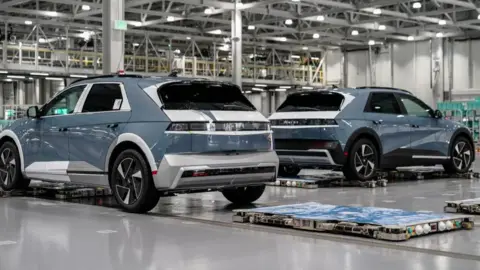SEOUL, South Korea (Neutral Echo) — South Korea's President Lee Jae Myung remarked on Thursday that the hesitation of Korean companies to invest further in the United States could largely hinge on improvements to Washington's visa system for their workforce. This statement came on the heels of the U.S. authorities releasing hundreds of workers detained in a Georgia factory during a recent immigration raid.
Speaking at a press conference marking his 100 days in office, Lee highlighted the implications of the September 4 immigration raid, which saw more than 300 South Korean workers arrested at a construction site for a Hyundai battery factory located near Savannah. Lee's call for an improved U.S. visa system reflects both his concerns and the broader sentiment in South Korea regarding the treatment of its workers.
Subsequent to the immigration operation, which involved the release of 330 detainees, including 316 Koreans, South Korea’s Foreign Ministry confirmed the safe return of these workers via a charter flight from Atlanta. The operation elicited serious backlash within South Korea, where many perceived it as an extreme measure by U.S. authorities.
The broad public anger was compounded by media comparisons of the raid to a 'rabbit hunt' initiated by U.S. immigration officials to meet alleged quota objectives of 3,000 arrests per day. Politicians from both major parties in South Korea condemned the detentions as heavy-handed, deepening the diplomatic tension between the two allies.
During the conference, President Lee indicated that ongoing dialogues between South Korean and U.S. officials focused on potential reforms to the U.S. visa system, which has been a longstanding grievance for South Korea. Lee emphasized that without a suitable visa system, South Korean companies would continue to hesitate on making investments in the U.S. labor market.
It’s not like these are long-term workers. When you build a factory, you need technicians, but the United States lacks that workforce and yet won't issue working visas for our people, explained Lee.
Instances have shown that many workers are currently relying on short-term visitor visas to complete necessary work at manufacturing sites, a practice that has encountered increasing scrutiny from U.S. immigration officials. The apprehension during the immigration raid highlights the necessity for a systematic improvement to facilitate the movement of skilled labor between the two countries.
In recent communications with U.S. Secretary of State Marco Rubio, South Korean Foreign Minister Cho Hyun announced an agreement to establish a joint working group aimed at exploring a new visa category for South Korean workers. Observers have noted that without a timely resolution of these visa issues, South Korean companies risk substantial operational delays, which could adversely impact both the U.S. economy and the facilities under construction.
Professors and experts in South Korea argue that the onus is primarily on the U.S. to enact legislative or administrative changes to address these visa challenges effectively. If left unresolved, the existing complications could deter investment and hinder economic growth mutually beneficial to both nations.




















